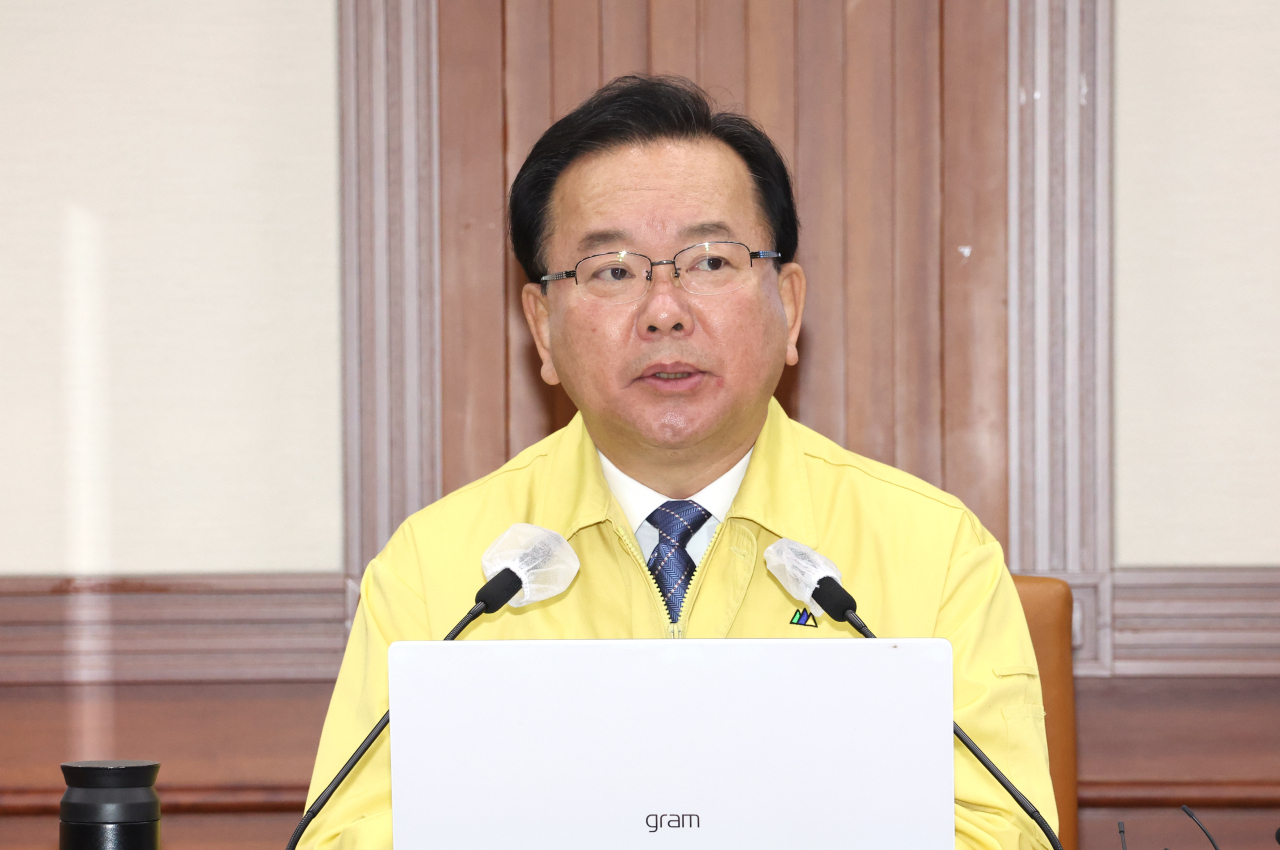Govt. considering placing price ceiling on COVID-19 rapid antigen test kits: PM
By YonhapPublished : Feb. 11, 2022 - 09:20

The government is considering placing a price ceiling on COVID-19 rapid antigen test kits, Prime Minister Kim Boo-kyum said Friday, as at-home testing and treatment has become a key element of the government's COVID-19 response.
Kim made the remark during a COVID-19 response meeting in Seoul as the government tries to ensure the stable supply of self-test kits following the initiation of an enhanced at-home treatment system amid soaring virus cases.
Driven by the highly transmissible omicron variant, the country has repeatedly renewed its daily COVID-19 record, with the latest tally surpassing 50,000.
To better deal with the situation, the country began to focus its medical resources on high-risk patients.
"It is true there is confusion and misunderstanding after we overhauled the virus response and medical systems ... with emphasis on speed and efficiency," Kim said. "But there will never be a situation in which the government gives up helping people in pain or turns away from them."
Under the new system, only those who test positive in rapid antigen tests will be able to receive polymerase chain reaction (PCR) tests in principle. People aged over 60 or in high-risk groups, such as those with underlying health conditions, will be prioritized for PCR tests.
To better protect people vulnerable to infections, the government also decided to distribute COVID-19 self-test kits for free to those at child care centers and elderly care facilities starting Feb. 21.
It will also ban the online sale of at-home test kits from Sunday, making the purchase of such kits available only at pharmacies and convenience stores.
Kim said the authorities are working on adjusting the subsidy amount for virus patients and quarantined people, lowering costs of diagnostic tests, and providing additional booster shot opportunities to people seeing waning immunity.
"It is also an important task to minimize economic and social damage by adjusting social distancing rules after analyzing our virus response circumstances," he said. "Once we judge that the situation can be managed to some extent while the number of serious cases and deaths are maintained at a stable level, we will make a courageous decision at any time." (Yonhap)
Kim made the remark during a COVID-19 response meeting in Seoul as the government tries to ensure the stable supply of self-test kits following the initiation of an enhanced at-home treatment system amid soaring virus cases.
Driven by the highly transmissible omicron variant, the country has repeatedly renewed its daily COVID-19 record, with the latest tally surpassing 50,000.
To better deal with the situation, the country began to focus its medical resources on high-risk patients.
"It is true there is confusion and misunderstanding after we overhauled the virus response and medical systems ... with emphasis on speed and efficiency," Kim said. "But there will never be a situation in which the government gives up helping people in pain or turns away from them."
Under the new system, only those who test positive in rapid antigen tests will be able to receive polymerase chain reaction (PCR) tests in principle. People aged over 60 or in high-risk groups, such as those with underlying health conditions, will be prioritized for PCR tests.
To better protect people vulnerable to infections, the government also decided to distribute COVID-19 self-test kits for free to those at child care centers and elderly care facilities starting Feb. 21.
It will also ban the online sale of at-home test kits from Sunday, making the purchase of such kits available only at pharmacies and convenience stores.
Kim said the authorities are working on adjusting the subsidy amount for virus patients and quarantined people, lowering costs of diagnostic tests, and providing additional booster shot opportunities to people seeing waning immunity.
"It is also an important task to minimize economic and social damage by adjusting social distancing rules after analyzing our virus response circumstances," he said. "Once we judge that the situation can be managed to some extent while the number of serious cases and deaths are maintained at a stable level, we will make a courageous decision at any time." (Yonhap)







![[Graphic News] Number of coffee franchises in S. Korea rises 13%](http://res.heraldm.com/phpwas/restmb_idxmake.php?idx=644&simg=/content/image/2024/05/02/20240502050817_0.gif&u=)

![[Robert J. Fouser] AI changes rationale for learning languages](http://res.heraldm.com/phpwas/restmb_idxmake.php?idx=644&simg=/content/image/2024/05/02/20240502050811_0.jpg&u=)








![[Eye Interview] 'If you live to 100, you might as well be happy,' says 88-year-old bestselling essayist](http://res.heraldm.com/phpwas/restmb_idxmake.php?idx=652&simg=/content/image/2024/05/03/20240503050674_0.jpg&u=)
